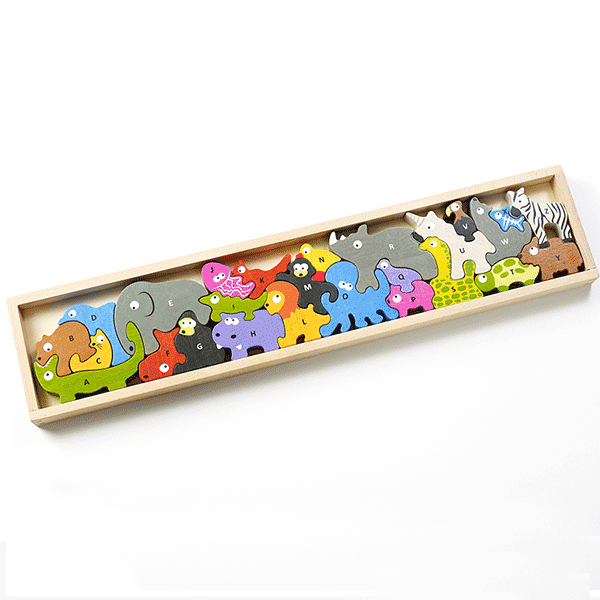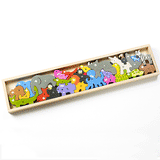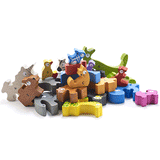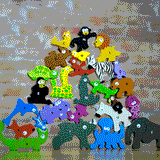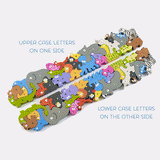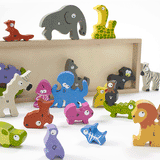Animal Alphabet Puzzle
Details
The fun is too much to bear! This award-winning animal alphabet puzzle is early-STEM problem-solving pleasure. A is for Alligator, B is for Bear, C is for Cat, D is for Dolphin and so on. Discover animals both commonplace and unusual while learning letter sounds.
The animal pieces connect with legs, fins, feet, tentacles, and ears. The pieces work double time as an animal play set, outside of puzzle building. All the pieces fit inside a natural beechwood box for storage or travel. The tray flips over and becomes a display or play space for the animals.
The three prestigious awards this alphabet puzzle has earned come from the Toy Industry Association and Parenting media firms. The experts love the flexibility and learning value of this puzzle.
ECO-FRIENDLY TOY
SIZE: 22.75" x 5" x 1"
AGE RANGE: 3-7 years
AWARDS:
- Parents Magazine Family Fun 2013 Toy of the Year Award
- Parenting Magazine Best in Play Award 2013
- Toy Industry Association's Toy of the Year Nominee, 2014 (TOTY)




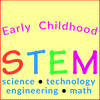
Developmental Value
Early reading skills begin with recognizing alphabet letters. Over time, children will become aware of the alphabet order. Adults can guide learning by offering the alphabet sounds. Later, adults can use the pieces to spell out simple words 'c-a-t' or 'b-a-t'.
Puzzles are a problem-solving activity developing cross-brain thinking skills. Effective problem solving requires a blend of both logic (left-brain activity) and creative (right-brain activity) thinking. Good problem solvers switch from one set of skills to the other. Cross-brain thinking is not always easy but becomes easier with problem-solving practice.
-
Logic (analytic) thinking develops through ordering the pieces, comparing them, contrasting them, evaluating them and selecting the correct piece. The child must select the best alternative from the options available by narrowing down the range of possibilities.
-
Creative thinking is developed when a piece doesn't fit because the child must consider a broader set of solving options such as manipulating the piece, flipping the piece, considering the alphabet order, or solving surrounding pieces.
This alphabet puzzle requires visual spatial relationship reasoning, a cognitive awareness of the relationship between adjoining pieces. Spatial awareness is critical to fundamental mathematics comprehension.
Puzzles build attention span. They require concentration for completion. The key for the adult is finding the sweet spot of difficulty. If a puzzle is too easy, it requires little concentration. If it is too hard, the puzzle becomes a source of frustration. If it doesn't feel like play, the positive learning experience shuts down.
This animal alphabet puzzle is an opportunity for relationship building when adults provide encouragement and support or play with the animals together as a play set.
The puzzle parts are large and chunky, supporting the early clutching and manipulating of pieces.
Because there is a carrying tray, this puzzle can be a travel toy for activities away from home. For homes who focus on Montessori shelving with work options, this puzzle sits orderly in its box.
Manufacturer
Located in Fort Collins, Colorado, BeginAgain believes in hands-on experiential toys, devoid of batteries. BeginAgain also has a strong commitment to eco-friendly products. Their complete line of products is made from plant-based materials. Any plastic, such as packaging, is 100% recycled. This durable wooden puzzle is handcrafted from sustainable plantation-grown trees.
BeginAgain chooses to use rubberwood (hevea brasiliensis) because it grows quickly. As a strong, sustainably grown hardwood, it is an excellent material for making heirloom quality toys.
The animal alphabet puzzle was designed in Fort Collins, Colorado. Manufacturing in China, near the native source of the wood, allows for smarter, more efficient use of energy, reducing the shipping footprint. The puzzles are packaged back in the USA, ensuring quality control. The manufacturing partner is female owned and family run. The factory believes in the principles of fair living wages and sustainable practices. Independent audits ensure fair working conditions, product safety and quality control standards.

